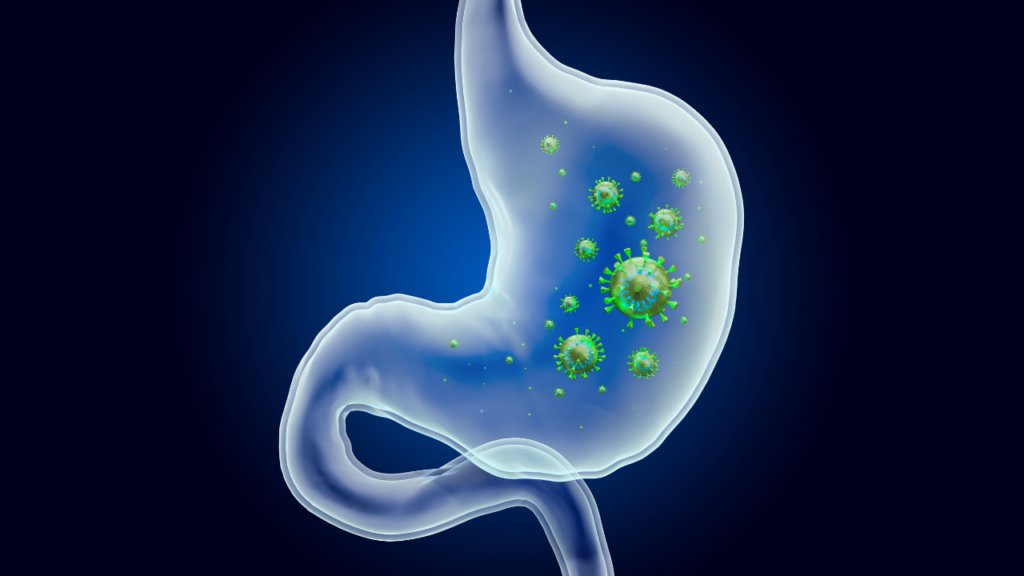Table of Contents
Exercise Daily – Nausea may occur at any moment of the day or night. Some disorders, on the other hand, may more likely cause you to feel queasy at night. If you are waking up nauseous in the middle of the night, you need to figure out the cause.
Although you might feel nauseated without having an underlying reason, nausea is more commonly a sign of another medical problem.
Continue reading to find out more about what might cause nighttime nausea, when you should visit a doctor, what treatment options are available, and how you can help alleviate your nausea at home.
Reasons For Waking Up Nauseous in the Middle of the Night?
There are many possible reasons for midnight nausea. The illnesses listed below are some of the potential causes of nausea at night.
Anxiety
Anxiety is characterized by sensations of nervousness and stress. It’s normal to have these kinds of emotions from time to time. Anxiety is something that almost everyone encounters at some point in their lives.

If you have these symptoms on a regular basis, or if your worry seems to be out of proportion to your present circumstances, you may be suffering from a condition known as a generalized anxiety disorder.
Whether you are dealing with regular problems or an anxiety condition, anxiety may become more severe at night. This might be due to the fact that you have fewer distractions at night as compared to the daytime.
When your mind isn’t preoccupied with anything else, you may find yourself dwelling on your concerns or troubles more often.
All forms of anxiety, especially social anxiety, may result in gastrointestinal problems, including nausea. Because anxiety may be stronger at night, it is possible that you may be more prone to nausea at night.
Among the other signs and symptoms of anxiety are:
- Restlessness
- Having difficulty focusing
- Increased rate of heartbeat
- Panic attacks
- Sweating
- Having difficulty falling asleep
GERD
If you’re waking up nauseous in the middle of the night, you might have GERD. Gastroesophageal reflux disease (GERD) is a condition in which stomach acid runs back up into the esophagus from the stomach. Acid reflux is another term for this condition.

It happens when the band of muscle that connects your esophagus to your stomach does not correctly seal or tighten. This results in heartburn. This permits the digestive fluids in your stomach to travel up and into your esophagus, allowing for better digestion.
Heartburn is the most prevalent symptom of gastroesophageal reflux disease (GERD), which is characterized by a painful burning feeling in the chest. In addition, you may detect a bitter sensation in the back of your throat. These symptoms may be accompanied by nausea as well.
Other signs and symptoms of GERD are as follows:
- Having difficulty swallowing
- Having the sensation that something is caught in your throat
- Dry cough
- Chest pain or discomfort in your upper abdomen
- Vomiting
- Asthma
Eating late at night might exacerbate symptoms of gastroesophageal reflux disease (GERD), such as nausea. This is due to the fact that reclining down, particularly after a large meal, makes it easier for acid to flow up into your esophagus from your stomach.
An adverse effect of medication
Nausea is a frequent adverse effect of drugs that leads to waking up nauseous in the middle of the night. These medications include the following:
- Antibiotics
- Aspirin
- Nonsteroidal anti-inflammatory drugs (NSAIDs)
- Blood pressure medications
If you take your prescription medicines at night, you may have increased nausea throughout the nighttime hours. Other signs and symptoms, as well as adverse effects, are dependent on the medicine.
Peptic ulcers
Peptic ulcers are lesions on the lining of your stomach or small intestine that are caused by stomach acid. It may be caused by the bacterium H. pylori. It is one of the most prevalent symptoms is discomfort between the ribs and the belly button.

Other signs and symptoms include:
- Nausea
- Burping
- Feeling satiated after consuming a tiny quantity of food
- Vomiting
- Stool that is dark or bloody
- Unexplained weight reduction
These sensations are often worse after eating and at night.
Pregnancy
Nausea is one of the most prevalent symptoms of pregnancy. Although nausea during pregnancy is often referred to as “morning sickness,” it may occur at any hour of the day or night.
Nausea is caused by an increase in hormone levels during pregnancy. It normally starts around week 6 of pregnancy and finishes around week 12 of the same. It is not harmful to you or your baby unless you are unable to keep meals down.
Gastroparesis
Gastroparesis is another medical condition that’s the culprit behind you waking up nauseous in the middle of the night. This is a condition in which the stomach is unable to empty itself of food as it should. It occurs more often in those who have diabetes. Among the other reasons are:
- Infections
- Surgery
- Scleroderma
- Narcotics
- Antidepressants
Gastroparesis may also be caused by damage to the vagus nerve, which helps your stomach muscles contract in order to pass food through your system. Because the food you consume during the day accumulates in your stomach, your symptoms may be greater at night.
Among the signs and symptoms of gastroparesis are:
- Nausea
- Heartburn
- Vomiting
- Feeling satiated after consuming a tiny quantity of food
- Bloating
- Reduction in body weight
Cyclic vomiting
Cyclic vomiting syndrome, while less prevalent, is another probable cause of nausea at night that may affect both adults and children. It’s an uncommon illness that produces recurring bouts of extreme nausea and vomiting, which may be life-threatening.

These bouts may last anywhere from a few hours to a couple of weeks. The majority of individuals experience episodes that are around the same duration each time. In between bouts of vomiting and nausea, you seem to be in good health.
In addition to nausea and vomiting, the following symptoms may occur:
- Pale skin
- Lethargy
- Dizziness
- Headaches
- Abdominal discomfort
- Dry heaving
The emotions of exhaustion and worry are both known to be triggers for cyclic vomiting syndrome. This might cause waking up nauseous in the middle of the night. As a result, cyclic vomiting syndrome is more prone to manifest itself at night.
When should you consult with a medical professional?
The majority of the time, nausea is just transient and will pass on its own. In other cases, it might be a symptom of a more severe issue. Consult your doctor if you experience any of the following symptoms:
- If your nausea lasts longer than a week, see your doctor
- You get nausea after eating on a regular basis
- Your nausea is accompanied by severe headaches and vomiting
- You are experiencing inexplicable weight loss
- Nausea and vomiting have returned many times over the period of at least one month
- You are unable to keep meals down, particularly if you are pregnant
You are having the following symptoms:
- Confusion
- Hazy eyesight
- Abdominal ache
Treatment of Nausea
Anxiety
When it comes to treating anxiety, psychotherapy, particularly cognitive-behavioral therapy (commonly known as CBT), is one of the most effective options.
This sort of treatment assists you in identifying and modifying negative or detrimental thinking habits. As soon as you become aware of these patterns, you may begin to learn how to reframe your ideas in a more positive manner.
In addition to these, there are other potential treatment methods for anxiety:
- Prescription anti-anxiety medicine
- Changes in way of life, such as increased physical activity
- Reduction in caffeine and alcohol intake
GERD
The following are the most often used treatments for GERD if you keep waking up nauseous in the middle of the night.
- Antacids
- H2 blockers, which are drugs that limit acid production
- Proton pump inhibitors, which are more powerful acid reducers
- If drugs are ineffective, surgery may be required.
Changes in way of life, such as avoiding spicy foods, not eating late at night, eating smaller meals, and reducing alcohol and caffeine intake, are recommended.
Adverse effects of medication
If you are experiencing nausea as a result of prescription medicine, speak with your doctor about switching medications. Take them at a different time of day to decrease nausea and other adverse effects.
It’s possible that you’ll need to take your prescription with food or drink as well.

It’s critical that you don’t stop taking your prescription on your own without consulting your doctor. Always consult with your doctor about the most effective approach to modify your medicine or the way you administer it.
If you are experiencing nausea from an over-the-counter drug, consider switching to a different kind, such as ibuprofen instead of naproxen.
Peptic ulcer
The following are the most often used treatments for peptic ulcers:
- Treatment with antibiotics for the removal of the H. pylori bacterium
- Antacids, H2 blockers, and proton pump inhibitors are all medications that are used to lower stomach acid and prevent waking up nauseous in the middle of the night
- Changes in your way of life, such as stopping smoking and avoiding foods that aggravate your symptoms, are recommended
Gastroparesis
Treatment for gastroparesis generally consists of the following steps:
- Drugs that aid in the proper movement of your stomach muscles
- Surgery
- Eating smaller meals and consuming food that is simple to digest
Cyclic Vomiting
Treatment options for cyclic vomiting syndrome may include the following:
- Anticonvulsants
- Anti-nauseous drugs
- Therapy for migraine headaches
- Treatment for dehydration; if the condition is severe, you may need to be admitted to the hospital and given IV fluids to recover.
- Avoiding potential triggers
Remedies available at home
In order to assist minimize the intensity of your nausea at home, there are a few things you may do. Seeking medical attention is critical if your nausea lasts for more than a week or worsens as time goes by. The following self-care practices may be beneficial in alleviating your nausea:
Raise your head
Raise your head up so that you aren’t resting flat on your bed. If it is possible for you, attempt to sleep with your head approximately 12 inches above your feet. Keep acid or food from going up into your esophagus with this kind of treatment.
Drink juices
If you keep waking up nauseous in the middle of the night, drink plenty of fluids. Drink a tiny quantity of a somewhat sweet drink, such as fruit juice, but stay away from citrus fruits and juices.
Slowly sip your beverage. As you begin to feel better, increase the quantity you’re taking.
Try herbal teas
Make a cup of ginger or peppermint tea and consume it several times a day help nauseous feeling.
Use peppermint candy cane
Suck on a peppermint candy cane which might help with nausea.
Simple food
Use light, bland foods such as simple crackers or bread before going to bed. Heavy meals may cause indigestion leading to nausea at night.
Avoid strenuous activity until you feel better, but avoid laying down for extended periods of time.
Frequently Asked Questions
Why do I wake up in the middle of the night extremely nauseous?
Nausea at night is usually a sign of a bigger problem. Some of the most common causes are acid reflux, anxiety, medication side effects, peptic ulcers, pregnancy, or taking medicine. Most of the time, nausea at night can be treated, either by yourself or by a doctor.
Why do I get sick in the middle of the night?
Cortisol levels in the blood are lower at night. Therefore, your white blood cells are more easily able to identify and fight infections in your body during this time, causing signs of infection to manifest themselves, such as fever, congested nose, and sinuses.
What side do you lay on for nausea?
Sleeping on your left side helps to alleviate the symptoms of acid reflux and heartburn. If stomach acid does escape, gravity will help it return to your stomach more quickly than if you were sleeping on your right side or back.
Does water help with nausea?
While you may be averse to adding anything to your stomach, drinking water might really aid in your recovery from nausea. Alternatively, you might try a herbal tea, such as peppermint or ginger, to help alleviate the belly blues.
Why does Coke help with nausea?
Carbonation may help lessen the stomach’s overall acidity, which may help alleviate nausea. Due to the fact that many individuals equate sweet tastes with satisfaction, a soda may help further alleviate that sensation.
Take Away
Nausea throughout the night is often an indication of a more serious underlying disease. Acid reflux, anxiety, drug side effects, peptic ulcers, and pregnancy are just a few of the most prevalent reasons.
Nausea throughout the night is frequently treated, either with self-care treatments or with the assistance of a physician. If waking up nauseous in the middle of the night is too uncomfortable, get assistance.
You should visit your doctor if your nausea is severe or long-lasting, or if you are experiencing severe headaches. They can determine the source of your nausea and collaborate with you to choose the most appropriate therapy.










